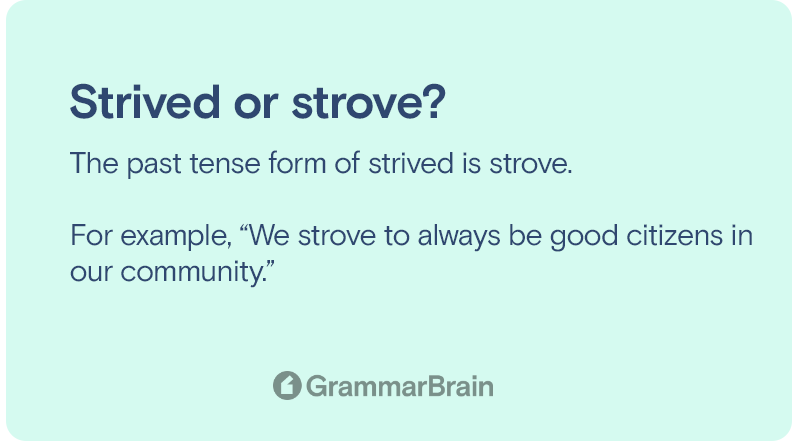Is it strived or strove? The word strive is an irregular verb. Irregular verbs don’t follow standard conjunction rules. This is why many people don’t know what the past tense form of the word strive is. The question is, “is it strived or strove?” Or is it both?
Let’s jump in…
What is the Past Tense of the Word Strive?
The past tense of the word “strive” is “strove.” Remember, strive is an irregular verb and does not follow common conjunction grammar rules.
Irregular verbs are a type of strong verb that have certain rules for forming the past tense form of them. These verbs don’t end with a -d, -ed, or -ied. They change their forms (or words) entirely. In this way, irregular verbs change into completely different words.
Verb conjugation irregularities can occur in several different ways. Sometimes the dropping of some words/letters occurs in patterns that seem unpredictable. This results from many conditional and selective historical pronunciation alterations to the word form.
Strong verbs in American English have gone through these types of changes. While patterns like stand-stood-stood and sing-sang-sing are descended from more or less regular patterns in American English, they are now restricted to a single verb or a small group of verbs in each situation (and are regarded as irregular).

When to Use the Word “Strove”
The word strive means to give serious effort or work hard. We use the word to express the hard work or the effort we give to achieve something.
If we have given effort to something and you are explaining this in the present time (present tense) then to express that situation, you can use the word “strove.” To get an idea of how this works, see samples of using the word “strove” in sentences below.
Examples of Using the Word “Strove” in a Sentence
Examples of using strove in a sentence are below:
We strove to connect the worker and the caregiver based on work ethic.
We became even closer as a result of my illness, and we made every strove to spend time together.
Ross strove to win the world championship, but Ryan beat him in just over a minute.
The government also strove to produce annual budget surpluses, despite criticism that it did not invest enough money in important social programs or infrastructure improvements.
They strove for control of medical knowledge while competing with one another.
The ferocious young soldier strove to escape the restrictions that bound him.
We strove for perfection, yet even though we fell short, we still made a significant contribution.
Small freeholders, who typically owned little land, strove their efforts primarily on maximizing the physical yield of their investments.
She had finally accomplished the objective for which she strove.
Additionally, the state worked harder and strove to turn tenant farms into owner-operators.
He strove to always live up to the light within of him.
He strove, as was his norm, to advise the young favorite on how to behave.
He didn’t merely mean to say that as a philosopher, he strove to consider the current situation of many academic disciplines.
Instead, the workers strove to give the working classes’ militancy a voice.
Being a devout man, he wrote and strove to promote tolerance and was adamantly opposed to the death penalty for heretics.
What Are Other Words For Strove? (Synonyms)
There are some synonyms of the word strove. These synonyms are:
- Struggled
- Worked
- Hustled
- Compete
- Banged away
- Seated blood
- Tackle
- Aim
- Seek
- Endeavor
Conclusion
The word “strive” is a verb that means to work assiduously to achieve something. The past tense of the word is conjugated as “struggle vigorously.”
The simple past form of the word is strove and the past participle form is “striven.” You should never use the word strived in its past tense (as it is an irregular verb).
FAQs
Is strove a word?
Yes, the word “strove” is a real word. It is the past perfect tense of the word “strive.”
Is strove grammatically correct?
Yes, the word strove is grammatically correct in American English. Just like several other irregular verbs, this word does not follow common conjunction grammar rules.
Inside this article
Fact checked:
Content is rigorously reviewed by a team of qualified and experienced fact checkers. Fact checkers review articles for factual accuracy, relevance, and timeliness. Learn more.
Core lessons
Glossary
- Abstract Noun
- Accusative Case
- Anecdote
- Antonym
- Active Sentence
- Adverb
- Adjective
- Allegory
- Alliteration
- Adjective Clause
- Adjective Phrase
- Ampersand
- Anastrophe
- Adverbial Clause
- Appositive Phrase
- Clause
- Compound Adjective
- Complex Sentence
- Compound Words
- Compound Predicate
- Common Noun
- Comparative Adjective
- Comparative and Superlative
- Compound Noun
- Compound Subject
- Compound Sentence
- Copular Verb
- Collective Noun
- Colloquialism
- Conciseness
- Consonance
- Conditional
- Concrete Noun
- Conjunction
- Conjugation
- Conditional Sentence
- Comma Splice
- Correlative Conjunction
- Coordinating Conjunction
- Coordinate Adjective
- Cumulative Adjective
- Dative Case
- Determiner
- Declarative Sentence
- Declarative Statement
- Direct Object Pronoun
- Direct Object
- Diction
- Diphthong
- Dangling Modifier
- Demonstrative Pronoun
- Demonstrative Adjective
- Direct Characterization
- Definite Article
- Doublespeak
- False Dilemma Fallacy
- Future Perfect Progressive
- Future Simple
- Future Perfect Continuous
- Future Perfect
- First Conditional
- Irregular Adjective
- Irregular Verb
- Imperative Sentence
- Indefinite Article
- Intransitive Verb
- Introductory Phrase
- Indefinite Pronoun
- Indirect Characterization
- Interrogative Sentence
- Intensive Pronoun
- Inanimate Object
- Indefinite Tense
- Infinitive Phrase
- Interjection
- Intensifier
- Infinitive
- Indicative Mood
- Participle
- Parallelism
- Prepositional Phrase
- Past Simple Tense
- Past Continuous Tense
- Past Perfect Tense
- Past Progressive Tense
- Present Simple Tense
- Present Perfect Tense
- Personal Pronoun
- Personification
- Persuasive Writing
- Parallel Structure
- Phrasal Verb
- Predicate Adjective
- Predicate Nominative
- Phonetic Language
- Plural Noun
- Punctuation
- Punctuation Marks
- Preposition
- Preposition of Place
- Parts of Speech
- Possessive Adjective
- Possessive Determiner
- Possessive Case
- Possessive Noun
- Proper Adjective
- Proper Noun
- Present Participle
- Prefix
- Predicate



